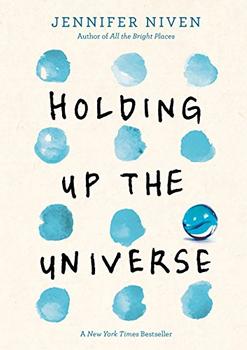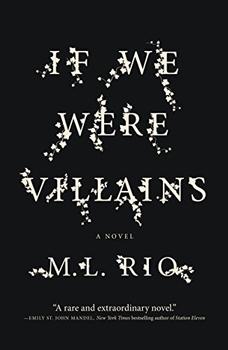Summary | Excerpt | Reviews | Beyond the book | Read-Alikes | Genres & Themes | Author Bio

Saving Hamlet captures the everyday turmoil of being a teenager as deftly as the Bard himself. While Molly Booth's debut is billed as a young adult novel, it speaks to a search for identity in a way that both young adults and those who have long left their teenaged years behind will be able to relate to.
Emma Adams is a shy athlete-turned-theatre-tech who is trying to reinvent herself during her sophomore year of high school. While learning to stage-manage the student production of "Hamlet", she unexpectedly finds herself falling through a trap door through time and into London's Globe Theatre during the original staging of one of Shakespeare's most infamous and intricate plays – and the same one her school happens to be producing: Hamlet.
By experiencing the play from behind the scenes in two time periods, Emma gains a deeper insight into its characters, as well as the friends who play them in her own time. The search for identity is a major theme of the novel, reflective of both Shakespeare's original work and of Elizabethan-era staging conventions. The characters navigate their changing identities within the historical context of cross-dressing on the Elizabethan stage. Booth weaves these journeys into both the past and the present – Emma witnesses actors playing female roles in the past; she watches a present-day student, who wants to play the title role of Hamlet, struggling with the ramifications of being honest about her own identity; and she, herself, struggles to make sure she fits in at the theatre. As Emma balances her life in two time periods, she gains a deeper understanding of, not only the play, but how people grow, react and adapt to their circumstances in different ways.
Overall, the plot is a straightforward bildungsroman, but Booth's wisest choice is to not offer superficial drama with a splash of fantasy and expect it to stand up to the play she has chosen as her background. The problems and pressures that Emma and her friends are facing, and the ways in which the adults around them respond to them, are reflective of what adolescents often struggle with without speaking up or asking for help. From the pressure to succeed, to struggling with sexual orientation and the potential consequences of coming out, to peer pressure and bullying, Booth illuminates experiences that educators and parents struggle to empathize with, and adolescents struggle to speak out about. Furthermore, by grounding her narrative in "Hamlet," where gender, identity, mortality, madness, and women's place and power are all central themes, Booth demonstrates that these concerns are ones which people have contended with for centuries. In some ways, Saving Hamlet shows that the answers to humanity's deepest questions will always require us to continue to reflect upon them, and the answers will change as often as the players on the stage.
What could have been a run-of-the-mill coming-of-age story is elevated through Booth's clear prose, and the detailed, expertly researched descriptions of the original staging of Hamlet, as well as the ways in which the play's staging changed over the years and under different directors. The students struggle with these choices while also grappling with their interpersonal relationships, which provides a level of depth to Booth's description of high school life. Additionally, readers will be able to learn about the conventions of performing a play before modern technology, with details ranging from how special effects were executed, how costumes were managed, what it took to be an actor in Shakespeare's time, and who was really responsible for ensuring performances went off without a hitch. Older readers will be reminded of how complex transitioning from adolescence to adult can be, and teens will be able to empathize with the experiences of Emma and her friends. It is this emotional appeal to multiple types of readers, woven into a touch of relatable fantasy, that provides the real strength of Saving Hamlet.
![]() This review was originally published in The BookBrowse Review in January 2017, and has been updated for the
November 2017 edition.
Click here to go to this issue.
This review was originally published in The BookBrowse Review in January 2017, and has been updated for the
November 2017 edition.
Click here to go to this issue.

If you liked Saving Hamlet, try these:

by Jennifer Niven
Published 2018
From the author of the New York Times bestseller All the Bright Places comes a heart-wrenching story about what it means to see someone - and love someone - for who they truly are.

by M. L. Rio
Published 2018
Intelligent, thrilling, and richly detailed, If We Were Villains is a captivating story of the enduring power and passion of words.
Your guide toexceptional books
BookBrowse seeks out and recommends the best in contemporary fiction and nonfiction—books that not only engage and entertain but also deepen our understanding of ourselves and the world around us.